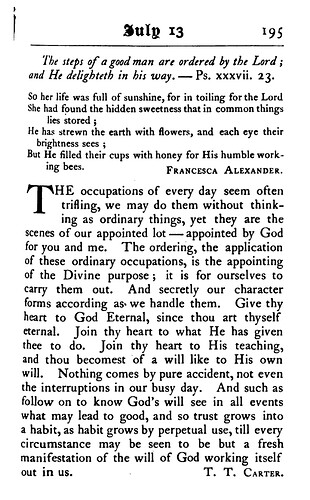Note the “will do” – that is a tensed verb and does not strictly apply. There is a mysterious (read “inscrutable”) dynamic between God’s timeless (actually ‘timeful’) will and ours where his ‘plans’ (another tensed word) come to pass and ‘simultaneously’ our free will is not violated. The wonderful and delightful mystery (or repulsive and terrifying to some) is seen when contemplating his orchestrations of providential interventions in his children’s lives.
Just within the last hours, a ‘trivial’ (there is no such thing with respect to God’s sovereignty unfettered by time), a ‘trivial’ example occurred that I can recount:
I had my first cataract surgery yesterday, and while my vision wasn’t terrible (glare at night was), I was surprised post-op by how much whiter whites were and how much brighter things are overall (today after pupil dilation had returned to normal ; - ). So I read:
Joy & Strength
So what jumps out at me but “…each eye their brightness sees”. ![]()
And then:
Nothing comes by pure accident, not even the interruptions in our busy day! And such as follow on to know God’s will see in all events what may lead to good, and so trust grows into a habit, as habit grows by perpetual use, till every circumstance may be seen to be but a fresh manifestation of the will of God working itself out in us.
Of course that latter is more than a little pertinent when speaking of Christians and doubt. (We also see examples of bad habits of thinking grow by perpetual use, some of mine included!)
So there is an example of God’s providential ordering of events, multiple relevant and interrelated ‘co-instants’ – though none ‘life-path-changing’ that we can see now anyway or like we have seen elsewhere here. No one’s free will was violated nor did anyone feel like a puppet in my making the appropriate appointments and scheduling as well as those involved at the ophthalmologist’s office and the surgery center, not to mention the timing of the devotional and its contents or its being read and by whom.
